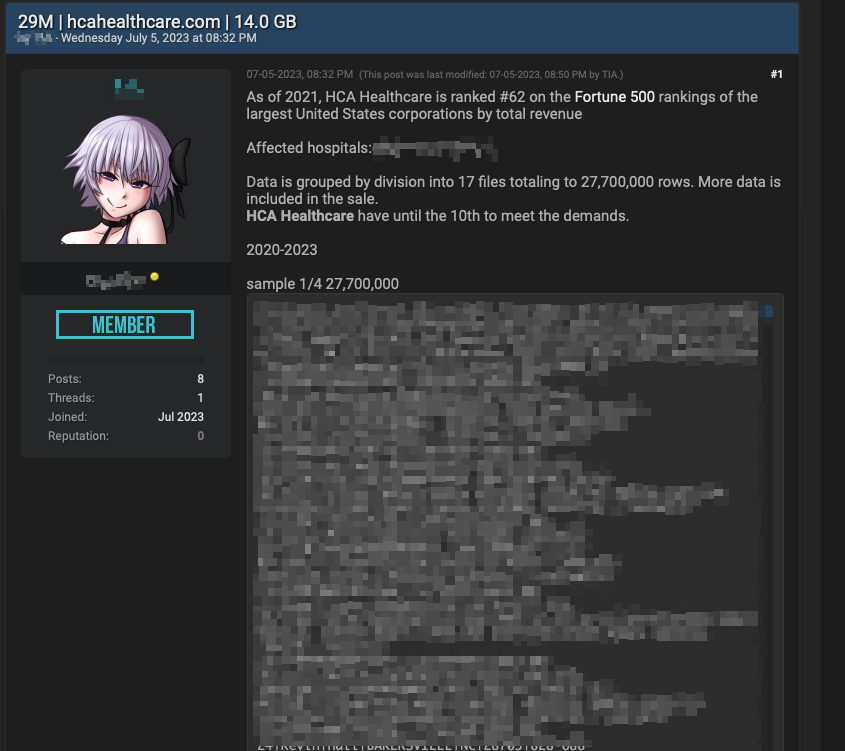In what could potentially be one of the largest healthcare-related data breaches of all time, HCA Healthcare recently fell victim to a cyber attack, exposing sensitive patient information.
The HCA Healthcare data breach incident occurred after an anonymous threat actor claimed to possess stolen data from HCA Healthcare and reportedly made it available for sale.
The healthcare giant, in response to the HCA Healthcare data breach, issued a press release acknowledging the breach and providing details of the compromised information.
HCA Healthcare data breach confirmed
According to the anonymous hacker’s post, the stolen data from the HCA Healthcare data breach is divided into various sections, comprising a staggering 27,700,000 rows across 17 files.
The threat actor also set a deadline of July 10th for HCA Healthcare to meet their demands.
HCA Healthcare, a prominent healthcare organization listed on the NYSE (NYSE: HCA), reported the incident and provided additional insights into the compromised information.

The list of exposed data in the HCA Healthcare data breach includes patient names, cities, states, zip codes, email addresses, telephone numbers, dates of birth, gender, patient service dates, locations, and next appointment dates.
However, HCA Healthcare emphasized that the list does not contain clinical information, payment details, or other sensitive data such as passwords, driver’s license numbers, or social security numbers.
Based on their initial investigation, the HCA Healthcare data breach was believed to involve an external storage location specifically used for formatting email messages.
The company assured patients there has been no disruption to its care and services, and day-to-day operations remain unaffected.
The healthcare centre is confident that the HCA Healthcare data breach will not materially impact its business, operations, or financial results.
Response to the HCA Healthcare data breach
To address the HCA Healthcare data breach, HCA Healthcare informed law enforcement authorities and engaged third-party forensic and threat intelligence advisors.
While investigations are ongoing, the company has not yet discovered any evidence of malicious activity related to the HCA Healthcare data breach.
User access to the compromised storage location has been restricted as an immediate containment measure.
Additionally, HCA Healthcare intends to reach out to affected patients to provide them with support and necessary information, as required by legal and regulatory obligations.
The company has offered credit monitoring and identity protection services to mitigate potential risks in certain cases.
The organization has also established a dedicated webpage at hcahealthcare.com/privacyupdate to keep patients informed.
Rise of cyber attacks on healthcare centers
The HCA Healthcare data breach is just one of healthcare-related data breaches.
According to the Center for Internet Security, the healthcare sector is “plagued by a myriad of cybersecurity-related issues.”
Cybersecurity and Infrastructure Security Agency (CISA) also shared an advisory called the Healthcare and Public Health Sector to explain the “highly publicized ransomware attacks on hospitals”.
In the advisory, CISA explains that relying on interconnected health information technology and utilizing wireless technologies exposes healthcare systems to vulnerabilities.
Recent ransomware attacks on hospitals have resulted in patient redirection and hindered access to crucial medical records.
Moreover, the advisory states that these attacks compromise patient data and incur substantial financial costs to regain control over hospital systems.
Even the most secure healthcare systems, from small practices to large integrated networks, have fallen victim to cyber intrusions.
The healthcare industry must prioritize cybersecurity and invest in protective measures to combat this growing menace.
It requires a collective effort involving hospitals, IT vendors, medical device manufacturers, and governments at all levels to mitigate risks and safeguard patient care.
Media Disclaimer: This report is based on internal and external research obtained through various means.
The information provided is for reference purposes only, and users bear full responsibility for their reliance on it.
The Cyber Express assumes no liability for the accuracy or consequences of using this information.
